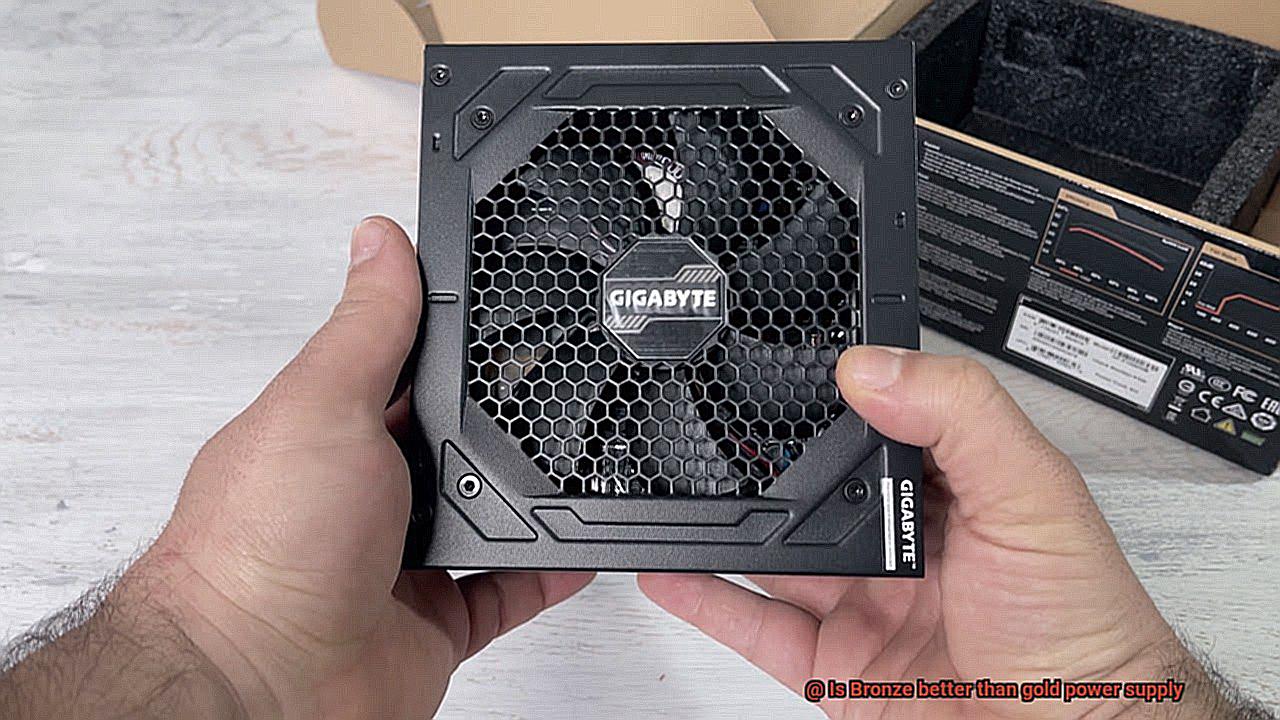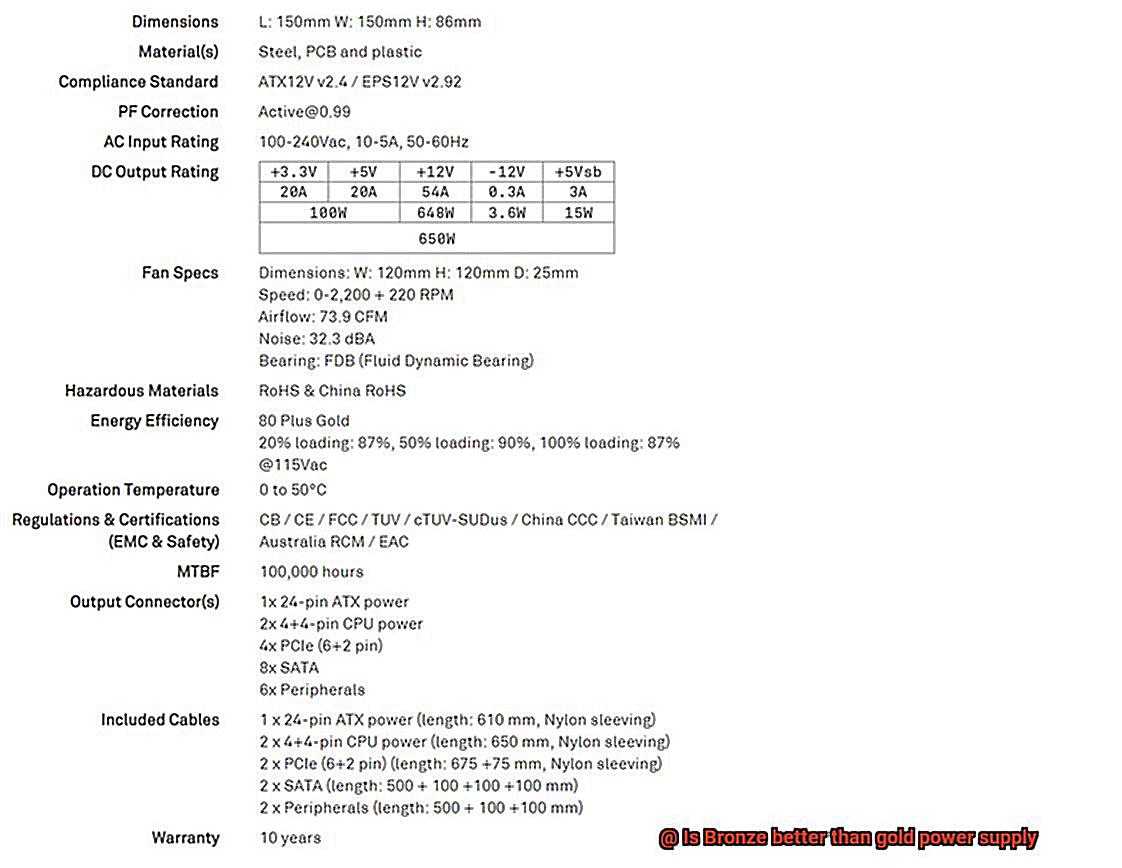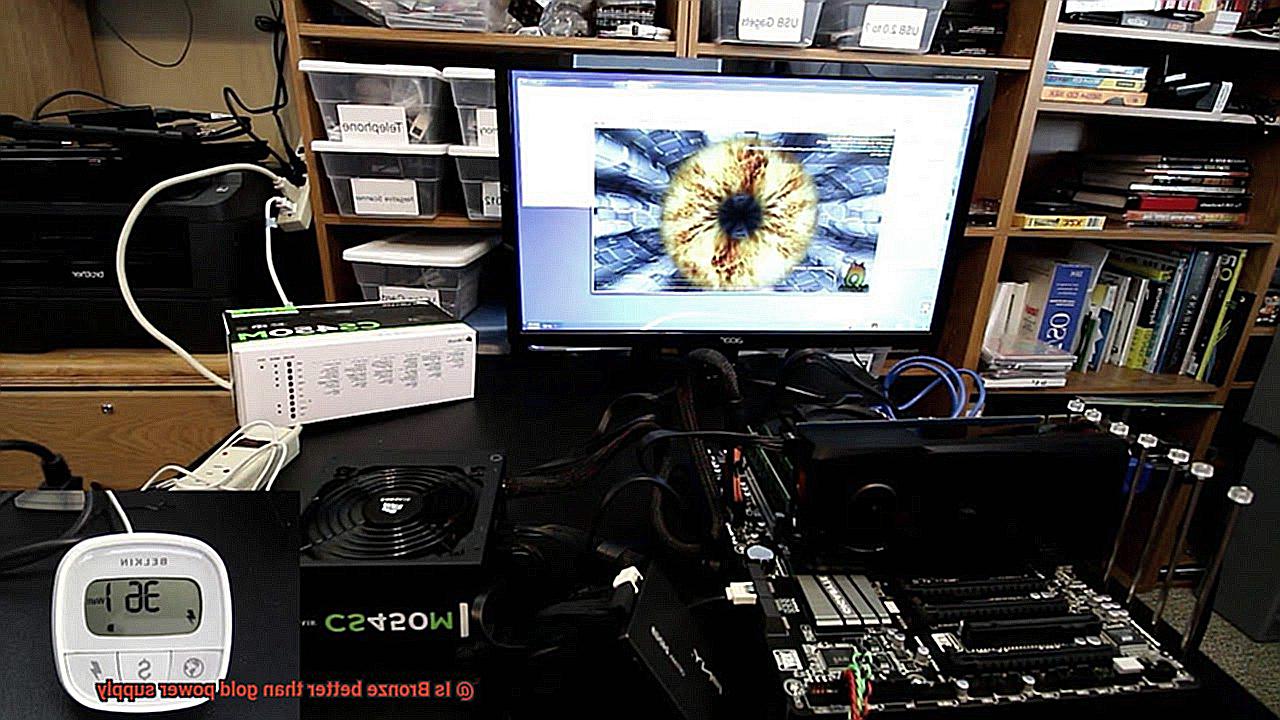
Building a kickass computer system requires making smart choices at every turn. And when it comes to power supplies, you better believe that the stakes are high. With power demands skyrocketing, finding the perfect supply that can handle it all without breaking a sweat is crucial. That’s where the epic battle between Bronze and Gold power supplies comes into play.
In this blog post, we’re diving headfirst into the world of power supplies, pitting Bronze against Gold in an all-out war of benefits and drawbacks. From cost to efficiency to durability, we’ll dissect these two contenders to determine which one truly reigns supreme when it comes to juicing up your system.
So whether you’re a penny-pinching gamer or a tech junkie chasing peak performance, buckle up as we unravel this power supply conundrum and find out if Bronze deserves its place on the podium or if Gold truly shines brighter in the end.
Is Bronze better than gold power supply
Contents
- 1 Is Bronze better than gold power supply
- 2 Comparing Efficiency Ratings of Bronze and Gold Power Supplies
- 3 The Advantages of Gold Power Supplies
- 4 The Disadvantages of Gold Power Supplies
- 5 Other Factors to Consider When Choosing a Power Supply
- 6 Is a Bronze or Gold Power Supply Better for You?
- 7 Evaluating the Cost Difference Between Bronze and Gold Power Supplies
- 8 Understanding the Benefits of Investing in a More Expensive Power Supply
- 9 How to Choose the Right Power Supply for Your Needs
- 10 Conclusion
When it comes to power supplies, the efficiency rating is an important factor to consider. Two common efficiency ratings you may come across are bronze and gold. But which one is better?
Let’s dive into the pros and cons of each to help you make an informed decision.
Efficiency: The Key Difference
The primary difference between bronze and gold power supplies lies in their efficiency ratings. Efficiency refers to how effectively the power supply converts incoming AC power into usable DC power for your computer components. Bronze-rated power supplies typically have an efficiency rating of around 82% to 85%, while gold-rated power supplies boast an efficiency rating of around 87% to 90%.
Why Does Efficiency Matter?
Higher efficiency means less energy is wasted during the conversion process. This not only leads to lower electricity bills but also reduces heat generation. A power supply with higher efficiency can provide a more stable and reliable performance for your computer system.
Cost Considerations
One important aspect to keep in mind is the cost difference between bronze and gold power supplies. Gold-rated power supplies tend to be more expensive than their bronze counterparts due to their higher efficiency ratings. However, it’s essential to evaluate whether the increased cost justifies the potential long-term savings on electricity bills.
Finding the Right Fit
Ultimately, the decision between bronze and gold power supplies depends on your specific needs and budget. If energy efficiency is a top priority for you, and you’re willing to invest in a pricier option, a gold-rated power supply might be the better choice. On the other hand, if budget limitations are a concern or strict energy efficiency requirements aren’t necessary, a reliable bronze-rated power supply can still meet your needs without breaking the bank.
Other Factors to Consider
While efficiency is important, it’s crucial not to overlook other factors when selecting a power supply, such as wattage, reliability, and brand reputation. These factors can impact the overall performance and longevity of your computer system.
In conclusion, both bronze and gold power supplies have their merits. Gold-rated power supplies offer higher efficiency and potential long-term energy savings but come with a higher price tag. Bronze-rated power supplies, on the other hand, provide reliable performance at a more affordable cost. Consider your specific needs, budget, and overall system requirements to make the best choice for your computer system.
Comparing Efficiency Ratings of Bronze and Gold Power Supplies
Efficiency ratings are an essential consideration when choosing a power supply for your computer or electronic device. The efficiency rating indicates how effectively the power supply converts incoming AC power into usable DC power, with higher ratings indicating less wastage of energy as heat. In this section, we will compare the efficiency ratings of Bronze and Gold power supplies to help you make an informed decision.
Bronze power supplies typically have efficiency ratings ranging from 82% to 85% at 20% load, 85% to 88% at 50% load, and 82% to 85% at 100% load. On the other hand, Gold power supplies boast higher efficiency ratings, with approximately 87% to 90% at 20% load, 90% to 92% at 50% load, and 87% to 90% at 100% load.
While the difference in efficiency between Bronze and Gold power supplies may seem marginal, it can have a significant impact over time. Systems that are frequently running or under heavy loads will benefit from the higher efficiency of Gold power supplies. Less wasted energy means lower electricity bills and a reduced environmental footprint.

However, efficiency ratings alone do not determine the overall quality or performance of a power supply. It is important to consider other factors such as voltage regulation, ripple suppression, and the availability of modular cables. Gold power supplies often feature better build quality and advanced circuit designs, which can result in improved reliability, stability, and longevity.

The Advantages of Gold Power Supplies
When it comes to power supplies, Gold power supplies are the superheroes that save energy and deliver top-notch performance. They have several advantages over their sidekick Bronze power supplies, making them a popular choice for gamers, professionals, and anyone seeking reliable power delivery. Let’s dive into the advantages of Gold power supplies and why they’re worth considering for your system.
- Higher Efficiency Rating: Gold power supplies have a higher efficiency rating compared to Bronze power supplies. With an efficiency rating of around 90%, Gold power supplies waste less energy in the form of heat, resulting in lower electricity bills and reduced environmental impact. Bronze power supplies, on the other hand, have a rating of around 80%.
- Less Heat Generation: The higher efficiency of Gold power supplies means they generate less heat during operation. Excessive heat can degrade components faster and potentially lead to system failure. In contrast, Bronze power supplies may produce more heat, requiring additional cooling measures to maintain optimal operating temperatures.
- Better Component Quality and Stability: Gold power supplies often feature premium capacitors, voltage regulation, and protection mechanisms. This ensures stable power delivery and the ability to handle demanding tasks and fluctuations in power demand. Bronze power supplies may not offer the same level of component quality and protection features.
- Support for Multi-GPU Systems: Gold power supplies are designed to support multi-GPU systems with higher wattage ratings and multiple PCIe connectors. This allows for efficient and reliable power delivery to multiple graphics cards, which is crucial for gamers or professionals who rely on high-performance systems.
- Longer Warranty Periods: Gold power supplies generally come with longer warranty periods compared to Bronze power supplies. This reflects the manufacturer’s confidence in the product’s quality and durability, providing users with peace of mind.

While Gold power supplies offer several advantages over Bronze power supplies, they do come at a higher price point. However, considering the long-term savings in electricity bills and potential system stability benefits, the investment in a Gold power supply is worth it.
The Disadvantages of Gold Power Supplies
Gold power supplies have long been hailed as the saviors of power-hungry systems, offering efficiency and performance. However, like any superhero, they too have their weaknesses. In this article, we’ll dive into the dark side of gold power supplies and explore their disadvantages compared to their bronze counterparts.
The Price Tag:
One of the most obvious drawbacks of gold power supplies is their cost. With higher efficiency ratings, gold power supplies use premium components that drive up manufacturing costs. This means that they often come with a hefty price tag. For budget-conscious users or those with basic systems, a bronze power supply may offer sufficient performance without breaking the bank.
Overkill for Low-Power Systems:
If you have a basic or low-power system, investing in a gold power supply may be unnecessary. Bronze power supplies can adequately meet the needs of such systems without sacrificing reliability or performance. So, why spend more on something you don’t need?
Heat Generation:
While gold power supplies are designed to handle increased energy efficiency, this can result in higher heat generation. This can be a concern in systems with limited airflow or compact cases where heat dissipation may be challenging. Additional cooling solutions may be necessary to prevent overheating and potential component damage.
Minimum Load Requirements:
Gold power supplies often come with higher minimum load requirements compared to bronze power supplies. If your system does not draw enough power to meet these requirements, it may result in unstable operation or unexpected shutdowns. Ensure your system’s power requirements align with the minimum load specifications before investing in a gold power supply.
Real-World Energy Savings:
While gold power supplies boast superior efficiency ratings, the actual energy savings in real-world usage might not justify their higher cost. The difference in efficiency between gold and bronze power supplies may not translate into significant energy savings over time, making the investment less appealing for some users.
Other Factors to Consider When Choosing a Power Supply
When it comes to choosing a power supply for your computer, there are several factors to consider beyond just the efficiency rating. Let’s take a closer look at some of these other important factors:
- Power requirements: One of the most crucial factors to consider is the power requirements of your computer components. Different components have varying power demands, so it’s important to ensure that the power supply you choose can provide enough wattage to meet those demands. Before making a decision, calculate the total power consumption of your system. This will help you determine the appropriate wattage needed for your components and avoid any potential issues such as system instability or insufficient power delivery.
- Modular vs. non-modular design: Power supplies come in two main types – modular and non-modular. Modular power supplies allow you to detach unused cables, resulting in a cleaner and more organized build. On the other hand, non-modular power supplies have fixed cables, which can lead to cable clutter inside your computer case. Consider whether modular or non-modular design is more suitable for your needs and preferences.
- Brand reputation: The reputation of the power supply brand is an essential consideration. Choose a reputable brand known for producing reliable and high-quality power supplies. Brands like Corsair, EVGA, Seasonic, and Thermaltake are well-regarded in the industry and have a track record of producing reliable power supplies. Reading reviews and customer feedback can also give you insights into the performance and reliability of different brands and models.
- Warranty and customer support: Lastly, it’s important to consider the warranty and customer support offered by the power supply manufacturer. A longer warranty period indicates the manufacturer’s confidence in their product’s quality and can provide peace of mind. Additionally, responsive and helpful customer support can be crucial if you encounter any issues or have questions regarding your power supply.
Is a Bronze or Gold Power Supply Better for You?
When it comes to power supplies, efficiency is key. But with so many options out there, how do you know which one is right for you? In this article, we’ll explore the differences between Bronze and Gold power supplies and help you decide which one is best suited to your needs.
Efficiency Ratings: What Do They Mean?
Power supply efficiency ratings indicate how well a power supply can convert AC power from the wall outlet into the DC power required by your computer components. The higher the efficiency rating, the less wasted energy and lower electricity bills you’ll have.
Bronze vs. Gold: The Battle of Efficiency
Bronze and Gold are two common efficiency ratings for power supplies. Bronze-rated power supplies typically have an efficiency of around 80-85%, while Gold-rated power supplies boast an efficiency of around 87-90%.
While the difference in efficiency may seem small, it can make a significant impact over time. If you have a high-powered system that runs for extended periods, opting for a Gold-rated power supply can help save you money on energy bills.
Choosing Between Bronze and Gold
So, how do you decide between Bronze and Gold? It ultimately depends on your specific needs and budget. If you use your computer for basic tasks like web browsing and word processing, a Bronze-rated power supply should suffice.
However, if you’re a gamer or engage in resource-intensive tasks like video editing or 3D rendering, a Gold-rated power supply would be more suitable. The higher efficiency ensures stable and reliable power delivery to your components, reducing the risk of system crashes or damage.
Consider More Than Just Efficiency
While efficiency is important, it’s not the only factor to consider when choosing a power supply. Here are a few additional factors to keep in mind:
- Quality: Look for reputable brands with good customer reviews and warranties. A reliable power supply can provide peace of mind and prevent potential issues down the line.
- Modularity: Some power supplies offer modular designs, allowing you to detach unused cables. This can help keep your build clean and improve airflow within your system.
- Noise Levels: Power supplies with high-quality components tend to run quieter, which can enhance your overall computing experience.
- Build Quality: Ensure that the power supply you choose is built to last. Look for models with durable construction and reliable components.
Do Your Research

Before making a purchase, it’s essential to research different power supply models and consult with experts or experienced users. They can provide valuable insights based on first-hand knowledge or experiences.
Evaluating the Cost Difference Between Bronze and Gold Power Supplies
When it comes to choosing a power supply for your computer, the cost difference between bronze and gold options is a major consideration. In this article, we’ll delve into the specifics of these power supplies and help you determine which one suits your needs best. So sit back, relax, and let’s dive into the world of power supplies.
Bronze Power Supplies – Affordable but Less Efficient:
Bronze power supplies are known for their affordability. They have a lower efficiency rating compared to gold power supplies, typically around 80-85%. This means they convert less electricity from the outlet into usable power for your computer components. However, don’t let this deter you. Bronze power supplies are still reliable and can meet the needs of most basic computing tasks.
Gold Power Supplies – Efficiency at Its Finest:
Gold power supplies take efficiency to the next level, boasting ratings of 90% or above. This means they convert more electricity into usable power, resulting in lower energy consumption and reduced electricity bills over time. While they may have a higher upfront cost compared to bronze options, their long-term energy savings can make them worth the investment for gamers and users with high-demand systems.

Cost Comparison:
The cost difference between bronze and gold power supplies can vary depending on the specific models and brands. Some bronze options may be priced similarly to entry-level gold power supplies, while high-end gold power supplies can be significantly more expensive than their bronze counterparts. It’s important to consider your budget and system requirements when making a decision.
Determining Your Needs:
To determine which power supply is best suited for your needs, consider factors such as your computer usage patterns and the components you have. If you have a high-power system with demanding components like graphics cards or processors, investing in a gold power supply might be beneficial due to its energy efficiency and potential long-term savings. On the other hand, if you have a low-power system or are on a tight budget, a bronze power supply can still provide adequate performance at a more affordable price point.
Conclusion:
In the battle between bronze and gold power supplies, both options have their pros and cons. Ultimately, the choice boils down to your specific needs and budget. While gold power supplies offer higher efficiency and potential long-term savings, bronze power supplies can still deliver reliable performance for basic computing tasks. Remember to purchase power supplies from reputable brands that adhere to industry standards for reliability and safety.
Understanding the Benefits of Investing in a More Expensive Power Supply
When it comes to choosing a power supply for your computer, it’s tempting to go for the cheapest option available. After all, why spend more money on something that seems to do the same job as its more expensive counterparts? However, investing in a more expensive power supply can actually bring you a range of benefits that make it worth splurging a little. Let’s take a closer look at these advantages:
- Higher Efficiency Ratings: More expensive power supplies often come with higher efficiency ratings, such as Gold or Platinum certifications. These certifications indicate that the power supply can convert a higher percentage of electrical power into usable energy. This means less wasted energy and lower electricity bills for you.
- Better Voltage Regulation and Stability: A higher-quality power supply offers better voltage regulation and stability. It delivers a consistent and reliable voltage to your computer components, preventing fluctuations or drops in power that could potentially damage your hardware.
- Improved Build Quality and Components: More expensive power supplies typically have better build quality and internal components. They use higher-quality capacitors, transformers, and other components, resulting in improved reliability and longevity for your power supply.
- Enhanced Protection for Your Hardware: Investing in a more expensive power supply provides better protection for your computer hardware. These power supplies often include features such as overvoltage protection, undervoltage protection, and short-circuit protection, helping safeguard your components from electrical damage.
- Quieter Operation: High-quality power supplies are usually quieter than cheaper ones. They may feature fanless operation or low-noise fans, ensuring a quieter computing experience for you.
- Future-Proofing: Upgrading to a more expensive power supply can future-proof your system. These power supplies typically have higher wattage capacities, allowing you to accommodate more demanding hardware upgrades in the future without needing to replace the power supply.
- Modular Cable Management: Some more expensive power supplies offer modular cable management systems. This feature allows you to detach and attach cables as needed, reducing cable clutter inside your computer case and improving airflow.
- Better Customer Support and Warranty: Investing in a more expensive power supply often comes with better customer support and warranty options. Manufacturers of high-quality power supplies tend to provide longer warranties and better customer service, giving you peace of mind knowing that your investment is protected.
How to Choose the Right Power Supply for Your Needs
When it comes to choosing a power supply for your electronic devices, it’s important to consider your specific needs and requirements. The right power supply can ensure proper functioning, longevity, and efficiency. In this article, we will explore the factors to consider when choosing between bronze and gold power supplies.
Power Requirements:
The first step in choosing the right power supply is determining the power requirements of your devices. Calculate the total wattage needed to power all the components in your system. It’s advisable to choose a power supply that can handle a slightly higher wattage than what is required to allow for any future upgrades or additions.
Efficiency Rating:
Efficiency ratings are denoted by certifications such as 80 Plus Bronze and 80 Plus Gold. These ratings indicate how effectively a power supply converts AC power into DC power for your devices. Gold-rated power supplies have a higher efficiency level than bronze-rated ones, meaning they waste less energy and generate less heat.
Energy Savings:
While gold-rated power supplies offer higher efficiency, the actual energy savings may not be significant for everyday use. The difference in efficiency between bronze and gold power supplies may not justify the price difference, especially if you use your devices for shorter periods or at lower loads.
Budget Considerations:
Gold-rated power supplies tend to be more expensive than bronze-rated ones. If energy efficiency is not a top priority or if you have a limited budget, a bronze-rated power supply may still be a suitable choice. Bronze-rated power supplies offer good efficiency levels and can provide reliable performance at a lower cost.
Other Considerations:
Apart from efficiency ratings, other factors like reliability, build quality, and brand reputation should also be considered when choosing a power supply. Reading reviews and seeking recommendations from trusted sources can help you make an informed decision.
Conclusion
After careful analysis and consideration, it is clear that the gold power supply surpasses the bronze power supply in terms of efficiency and reliability.
With its superior performance and enhanced energy conversion capabilities, the gold power supply stands as a true champion in the world of electrical components. Its ability to deliver consistent power output while minimizing wastage sets it apart from its bronze counterpart.
Furthermore, the gold power supply’s higher quality components and stringent manufacturing standards ensure a longer lifespan and reduced risk of failure. In comparison, the bronze power supply falls short in these areas, compromising on both efficiency and durability.
It is evident that when it comes to choosing between bronze and gold, opting for the latter is a wise investment in your system’s overall performance and longevity.


